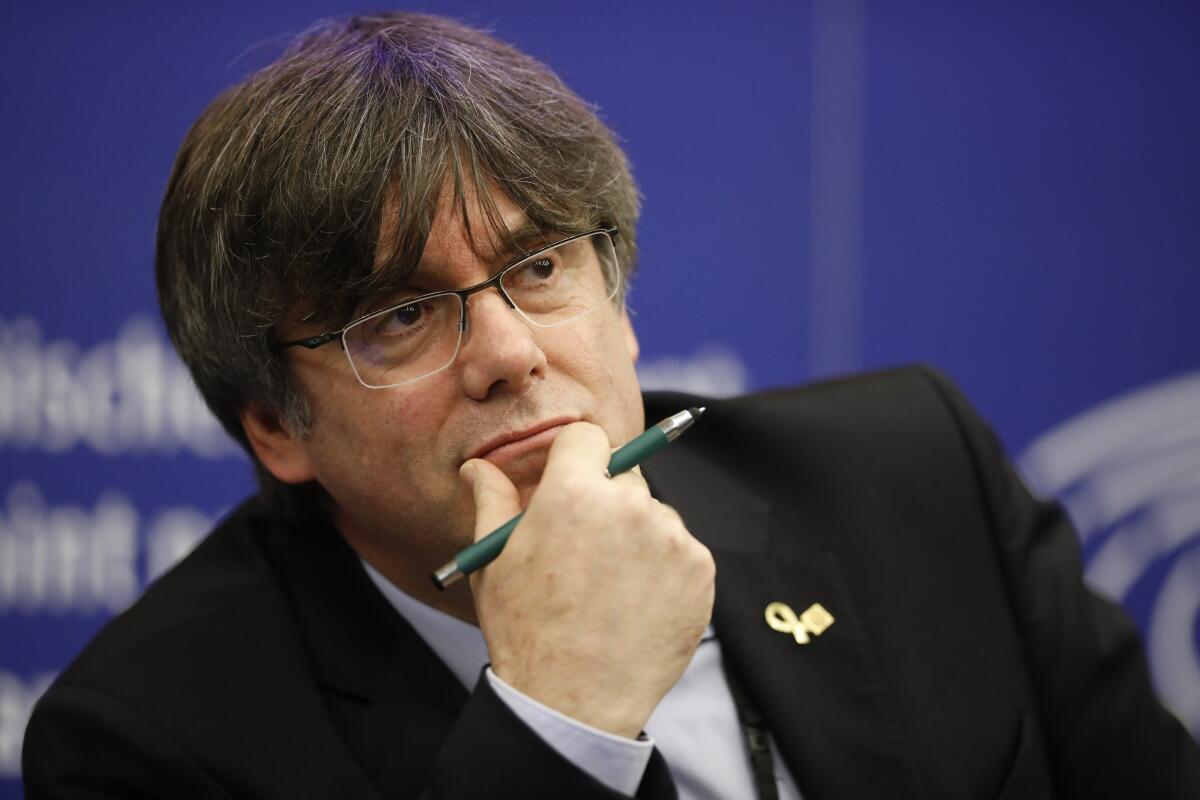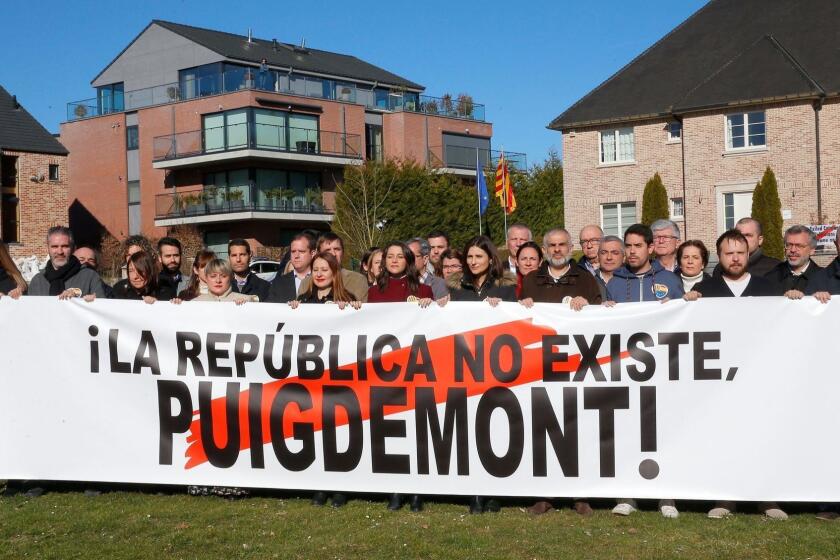European lawmakers lift immunity of 3 Catalan separatists

- Share via
BRUSSELS — The European Parliament on Tuesday voted to lift the immunity of the former president of Spain’s Catalonia region, Carles Puigdemont, and two of his associates, a move that could pave the way for the eventual extradition of the three independence advocates.
All three are currently members of the European Parliament. In the decision on Puigdemont, 400 legislators voted for the waiver of immunity, 248 were against, and 45 abstained. The votes to lift the immunity of his associates — former Catalan Health Minister Toni Comin and former Education Minister Clara Ponsatí — were by largely similar margins.
“We have lost our immunity, but the European Parliament has lost more than that — and, as a result, European democracy, too,” Puigdemont said. “This is a clear case of political persecution.”
He said that “the European Parliament has unfortunately fallen into this strategy.”
Puigdemont and a number of his colleagues fled from Spain to Belgium in October 2017, fearing arrest after holding an independence referendum in Catalonia that the Spanish government said was illegal. Catalonia, in northeastern Spain and home to Barcelona, has long asserted its own cultural and national identity.
In 2019, Puigdemont, Comin and Ponsatí won seats in the European Parliament and were afforded protection as members of the legislative assembly.
The talks seemed like the most realistic opportunity in some time for greater autonomy of the region, which voted for independence in a 2017 referendum that Spain considered illegal.
Ponsatí said the three would appeal the assembly’s decision to the EU’s higher courts in Luxembourg.
“We are very convinced that we have very strong grounds for this appeal,” she said, adding that the legislature’s handling of the move was “clumsy, sloppy and without due procedure.”
“The conflicts of interest that interfere[d] in the process were outrageous,” she said.
Spanish Foreign Minister Arancha González-Laya said the assembly’s decision showed that Puigdemont and his two aides could no longer evade justice back home. “The problems of Catalonia are solved in Spain. They are not solved in Europe,” González-Laya said in a video statement.
The Catalans come in droves, carrying separatist flags and cameras to photograph the nondescript brick house on a quiet road in the town where Napoleon suffered his final defeat more than two centuries ago.
Dolors Montserrat, a European lawmaker with the center-right European People’s Party and a former Cabinet member of the Spanish administration that ousted Puigdemont, told Spanish broadcaster TVE: “Spain wins, Europe wins, democracy wins.” She added that the decision confirmed Puigdemont as “a fugitive who has to answer before Spanish courts.”
Iratxe García Pérez, the leader of the S&D socialist group in the European Parliament, said that the parliament “doesn’t judge anybody. We just guarantee that justice does its job. A clear majority, absolute majority of the parliament, supported the fact that Spanish justice should be able to do its job.”
Despite the wide margin to lift the three lawmakers’ immunity, Gonzalo Boye, Puigdemont’s lawyer, said the vote wasn’t as overwhelming as Spain wanted it to be.
“It’s evident that there are people in the conservative group, in the EPP, and among the Socialists who have voted against,” he told TVE.
News Alerts
Get breaking news, investigations, analysis and more signature journalism from the Los Angeles Times in your inbox.
You may occasionally receive promotional content from the Los Angeles Times.
The 2017 independence vote in favor of Catalonia breaking away from Spain won by a landslide, but the central government in Madrid had declared the vote illegal and unconstitutional. Hundreds of people were injured in a police crackdown on the day of the poll.
Spain has attempted to have Puigdemont returned for trial but failed to convince Belgian authorities to extradite him. Spain could well start new efforts now to have him extradited.
Since 2017, official elections have repeatedly shown Catalonia’s voters to be equally split over the secession question.
More to Read
Sign up for Essential California
The most important California stories and recommendations in your inbox every morning.
You may occasionally receive promotional content from the Los Angeles Times.















